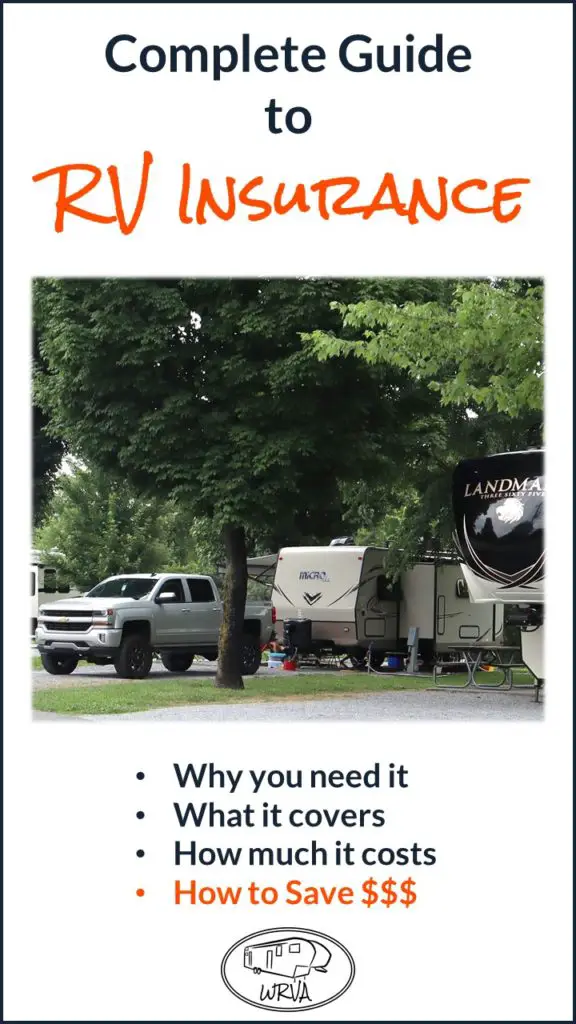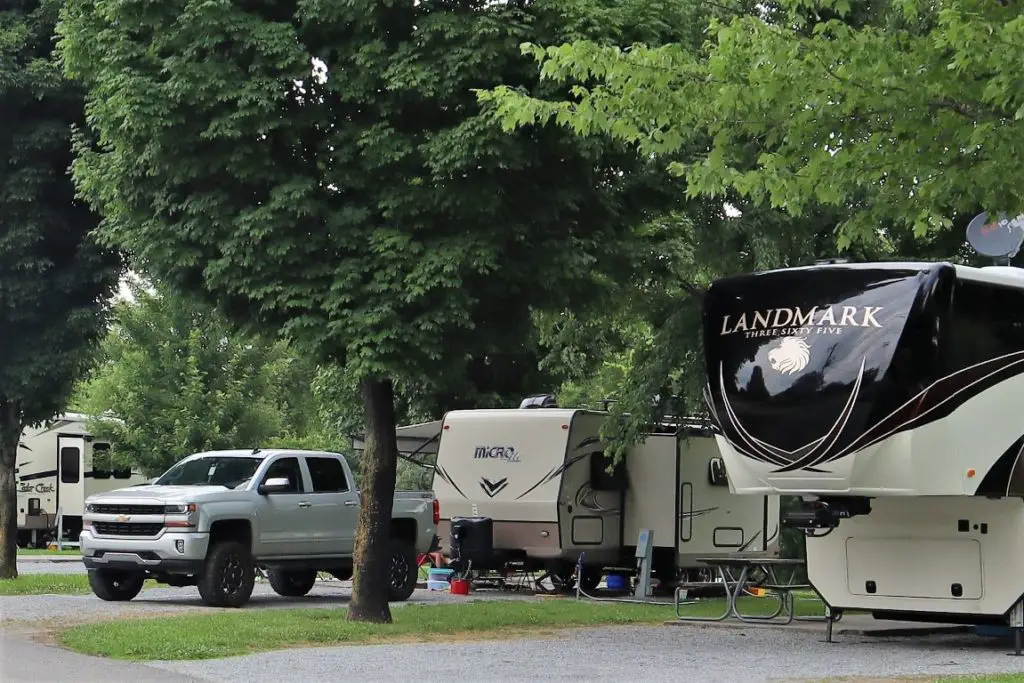Oh insurance. We love and hate you. We love you when something happens and you jump to the rescue. We hate you when nothing happens and we threw a bunch of money at you for no reason. Well…except maybe peace of mind.
So what is travel trailer insurance for and why do you need it? And how much is it? Let’s see if I can answer some of these questions.
Why Do You Need Insurance?
Let’s first start with the why. Until you feel sure you need it, you won’t bother with all the hassle of getting it. Well the number one reason is…
It’s the law!
Well in most states it is. Best to double-check with your local DMV of where you call your permanent home. But generally these are the reasons you are required to have it:
- You have a Class A or B motorhome
- You financed your RV and are still making payments
- Your RV is a rental vehicle
When It’s Optional
There are a few reasons you are allowed to drive around without RV
insurance, but again, make sure you check with your state laws first. You have
the option to cover your trailer if:
- It’s towable and not drivable (you pull a fifth-wheel, camper, or trailer)
- Own your RV/paid off and your state does not require RV insurance or liability insurance
Other reasons you should get it
Nature
Unless you’re Bruce Almighty, you are not able to control Mother Nature. Especially since you will be traveling to other states or clear across the country, you will most likely encounter storms, snow/ice, tornadoes, hurricanes, or even sharknados. Well maybe not that last one…but you never know. Nature is not something you want to take a gamble on, she can be a bully sometimes.
Theft
I just read an article that Gerard Butler’s 1969 Airstream was stolen out of his yard while he was in the process of restoring it. He can easily afford another one, but he hopefully had insurance on it and won’t have to pay to replace it. Sorry Gerard. But all this to say, it could happen to you too. RVs almost have that “I dare you to steal me” look on them. Not something you want to risk either.
Crazy Drivers
That includes you too! You’re taking these things out on the open road. This is probably the most dangerous place for your home on wheels. You definitely want to make sure you’re covered. Not to mention, you have a much bigger vehicle on the road and you could do some pretty serious damage too.
What type of insurance do you need?
Ok, hopefully I’ve convinced you that you NEED insurance, no matter what the situation. But what kind? How do you know how much coverage you need, and for what? Well, I’m here to help you with that too. Let’s go down the list of things to consider when deciding on the type of insurance you will need.
State requirements
I know I already said this earlier, but I’m gonna say it again because it will dictate the type of insurance you get. Some states have more strict laws than others and there’s really only one way to find out. Go to your local DMV’s webpage and look for a tab on insurance or liability requirements.
Vehicle Type
Liability insurance will be based on the size of rig and also the value. Some RVs are more expensive to repair, so the coverage will need to be higher.
Leased or Financed
Are you still making payments? In this scenario you will usually have to carry at least minimum insurance coverage in case of an accident. Once it’s paid off you can lower your premium.
Deductible
Another consideration is the deductible you want. Higher deductibles will lower your overall premium, but keep in mind if something does happen, that is what you will be paying out of pocket.
Coverage Limits
Like deductible, you might be tempted to go for the lower coverage limits but you could regret that decision. Just know what you’re comfortable paying in the event something happens.
Full-Timers Coverage
Lastly, if you are taking a year to live on the road, then you will definitely want to choose the Full-Timers coverage. This is similar to homeowner’s insurance vs. renter’s insurance. It’s fully customizable and much more comprehensive coverage than the weekend campers.
Who to Choose?
Well I’m going to cheat here a little bit and make some suggestions of websites that will help you find the best price for what you need. It’s similar to using a search engine for travel plans, like Orbitz or Hotels.com. These sites will do the hard work for you and make recommendations on the best-priced and quality of insurance.
This has a “10 Best RV Insurance of 2019” list. When you get to this site you simply put in your zipcode and it pops up with the top rated RV insurance companies for your area. From there you will be able to get individualized quotes from each company.
This
one has a similar set up. You start with your zip code and from there they will
have you answer certain questions to be able to make the best recommendations.
They also have a number you can call if you prefer human contact.
How
Much Will It Cost?
This is pretty much a big fat, I don’t know. There’s really no way of telling you what your RV insurance will cost. As you have seen in this article, there are a number of variables and factors that are taken into consideration when calculating your premium. The state you live in, the type of insurance and what all you need covered will play a big part.
The best thing to do is click on one of those links or call to discuss your options and get a few quotes to help you make the best decision.
Upgrades:
Also when you’re considering cost, you will want to be aware of the add-ons. These are things that don’t come standard but are worth considering when you get quotes. I would go ahead and ask your representative to price out these different options in addition to the basic package.
Full Replacement Cost Coverage
This is a smart upgrade because if you get in an accident 3 years after you bought your motorhome, you will get the amount you need to replace it, not how much it’s worth 3 years later. As with cars, you pretty much lose value the second you drive your brand-spanking-new RV off the lot. So replacing its value will only get you what it’s worth at the time of the incident. Full replacement will give you the ability to buy what you have again.
Bodily Injury
Most plans seem to come with $250k worth of bodily injury coverage. However, a number of reviews mentioned that it was as little as $1 more a month to get $500k instead! That’s a HUGE jump in coverage for a very low cost.
Roadside Assistance
If you don’t already have this through someone like AAA, definitely go for this option! And it’s usually not that much more per year and TOTALLY worth it. But also make sure you ask on the front end if the company you’re considering already offers this. Many insurance companies include this nowadays.
Coverage for personal items
If there are things you travel with like bikes, generators, jet skis, kayaks, anything that someone would want to steal…you should get that covered too. Many RV insurance companies offer personal property coverage. Again, something worth factoring in because they can get damaged or stolen too and the stuff we like to use for recreation is usually not cheap to replace!
Money Saving Tricks for RV Insurance

Finally on to the good news! There are a couple ways you can also save money on your RV insurance. Similar to auto insurance it is definitely worth asking what deals or discounts they are currently offering. If you have a clean driving record or you add on a certain upgrade, they may reward you. But here are the main two that I found when it comes to this special type of insurance.
Multi-Vehicle discount
There may be a major benefit in going with your current auto insurance company if they also offer RV coverage. A lot of times they have a “bundle and save” option that winds up saving you quite a bit of money.
Storage option
Almost all of the RV insurance companies I checked out offer a “storage option.” This basically means that you can let the company know when you’re not going to be using your RV for a few months and they will not charge you the full amount. Some people reported this saved them hundreds of dollars over the year. You do still have coverage for wherever it’s being stored in case of a fire, storm damage or theft. So definitely make sure that whatever company you choose has this option as well.
Wrap Up

I feel like we’ve covered a lot of ground here! I wish I could give you a solid number to expect when it comes to RV insurance, but that’s like you asking me how much homeowner’s insurance is. It’s all customized and tailored to the type of rig you have, what type of coverage you want, and a handful of other factors. The good news is that there are great sites that will help you compare prices and provide reviews on the various insurance companies. I am confident that you will be able to find what is just right for you!
[share title=”If you found this informative, Please to use the links below to share this article” twitter=”true” facebook=”true” pinterest=”true” email=”true”]
